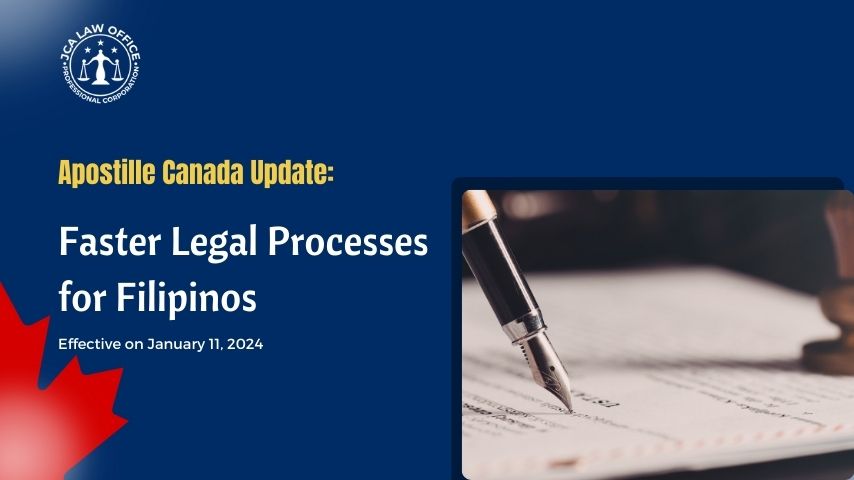1. Canada’s Journey to the Apostille Convention
Canada’s decision to join the Hague Apostille Convention represents a significant shift in its approach to document legalization. Historically, the process of authenticating Canadian public documents for international use involved a series of complex steps, often requiring multiple authentications and legalizations by different authorities, including foreign consulates or embassies in Canada.
Historical Context
Before the Apostille Convention, Canadians faced a cumbersome process to have their public documents such as birth certificates, marriage certificates, and educational documents recognized in other countries. Each document required verification by Canada’s foreign affairs department and then further legalization by the consulate or embassy of the destination country. This process was not only time-consuming but also costly.
Global Affairs Canada’s Announcement
On May 16, 2023, Global Affairs Canada formally announced Canada’s accession to the Apostille Convention. This move was aimed at simplifying the authentication of Canadian public documents for use abroad. The convention came into effect in Canada on January 11, 2024.
The Apostille Convention allows for a standardized certificate, known as an ‘apostille’, to authenticate public documents. This certificate makes Canadian documents acceptable in any of the 124 member countries of the convention. The Philippines became a party to the Apostille Convention on May 14, 2019. This change promised a more cost-effective and streamlined method for Canadian citizens and businesses, with over 200,000 Canadian public documents being authenticated annually.
Reasons Behind the Adoption
The Government of Canada’s decision to join the Hague Apostille Convention was driven by a desire to provide a more efficient and cost-effective method for legalizing documents for international use. This was in response to the growing need for global legal cooperation and the increased mobility of citizens and businesses. The Apostille Convention, as one of the most widely applied multilateral treaties, offered a solution that could significantly reduce the bureaucratic burden associated with document legalization.
Decentralizing Authentication Services
A significant aspect of this transition was the decentralization of the authentication process. Starting January 11, 2024, provinces such as Alberta, British Columbia, Ontario, Quebec, and Saskatchewan took responsibility for issuing apostilles for documents issued or notarized within their jurisdictions. Global Affairs Canada continued to issue apostilles for documents from the remaining provinces, the territories, and the Government of Canada itself.
The Impact of the Change
This change in the authentication process in Canada is a reflection of the country’s commitment to aligning with global practices for legal cooperation. It not only simplifies the process for Canadians but also aligns Canada with international standards in document legalization. The shift to the Apostille Convention is a testament to Canada’s responsiveness to the needs of its citizens and its role in the global community.
2. Implications for Filipinos in Canada
Here are some specific examples illustrating how the new system benefits Filipinos in Canada:
Handling Property Transactions in the Philippines:
- Scenario: Elena, a Filipino-Canadian in British Columbia, plans to sell her inherited property in the Philippines. She needs to authenticate legal documents, including a Deed of Sale, a Special Power of Attorney, and a Deed of Extrajudicial Settlement.
- Before the Apostille Convention: Elena would have required multiple authentications for her documents – first from Canadian authorities, then further legalization by the Philippine embassy or consulate in Canada.
- After the Apostille Convention: Elena simply submits her documents to the relevant authority in British Columbia for an apostille. The apostilled documents are then recognized in the Philippines without the need for additional embassy legalization, significantly simplifying her property transaction process.
Family Reunification:
- Scenario: Ana, a Filipino permanent resident in Canada, is sponsoring her husband from the Philippines for Canadian residency. She needs to authenticate her marriage certificate and other personal documents.
- Before the Apostille Convention: The process involved multiple steps including authentication by Canadian authorities and possible additional verification by the Philippine embassy in Canada.
- After the Apostille Convention: Ana gets an apostille for her marriage certificate, which simplifies the document verification process for her husband’s residency application.
Student Applying for Study Abroad:
- Scenario: Maria, a Filipino student in Canada, plans to pursue further studies in Spain, a member of the Apostille Convention. She needs to authenticate her Canadian university transcripts and diploma.
- Before the Apostille Convention: Maria would have needed to first get her documents authenticated by Canadian authorities and then go through the Spanish consulate in Canada for further legalization.
- After the Apostille Convention: Now, Maria simply submits her documents to the relevant Canadian authority (like a provincial office or Global Affairs Canada), which issues an apostille. The apostilled documents are readily accepted in Spain, saving her time and reducing complexity.
Entrepreneur Establishing a Business Overseas:
- Scenario: Carlos, a Filipino entrepreneur in Ontario, is expanding his business to the Philippines. He needs to authenticate his business incorporation documents, corporate powers of attorney, and other legal documents.
- Before the Apostille Convention: Carlos would have had to go through a lengthy process of authentication by Canadian authorities, followed by legalization at the Philippine embassy or consulate in Canada.
- After the Apostille Convention: Carlos obtains an apostille for his documents, which are then immediately valid for use in the Philippines, streamlining his business expansion process.
Professional Credentials Recognition:
- Scenario: Jose, a Filipino nurse working in Canada, wants to apply for a job in France. He needs to authenticate his Canadian nursing degree and professional certifications.
- Before the Apostille Convention: This would involve several steps of authentication and legalization through both Canadian and French authorities.
- After the Apostille Convention: Jose gets his educational and professional documents apostilled in Canada, which are then readily accepted in France, facilitating his job application process.
Types of documents commonly used by Filipinos in Canada that are now eligible for an apostille:
- Birth Certificates: Vital for proving identity, applying for passports, and other legal processes.
- Marriage Certificates: Essential for spousal sponsorship, immigration purposes, and legal recognition of marital status in the Philippines or other countries.
- Death Certificates: Necessary for estate settlements, insurance claims, and various legal matters involving the deceased’s assets or dependents.
- Diplomas and Degrees: For Filipinos who have completed studies in Canada, these documents are crucial for employment or further education in the Philippines or elsewhere.
- Transcripts and Academic Records: Often required for admission into educational institutions or for job applications, especially for those continuing their education or seeking employment abroad.
- Special Power of Attorney (SPA): Important for legal representation in matters like buying or selling property, managing financial affairs, or obtaining private documents, especially when the principal is abroad.
- Court Documents: Includes divorce orders, adoption papers, and other legal judgments that may be relevant in cross-border legal scenarios.
- Corporate Powers of Attorney: For business transactions where a representative is appointed to act on behalf of a company.
- Business Registration Documents: Crucial for international trade, business expansions, and transactions where proof of business legitimacy is required.
- Medical Records: Used for a variety of reasons, including immigration, employment, or education.
- Police Clearance Certificates: Often needed for immigration or employment, especially in roles that require security clearance.

Get Your Documents Apostilled in Canada Today
Contact us today and let us help you with the process.
3. Practical Steps for Availing Apostille Services
The documents for apostille should be sent to the proper authority. The following is a guide on where to bring your documents for apostille services:
Global Affairs Canada
Global Affairs Canada (GAC) is responsible for issuing apostilles for documents originating from the Government of Canada (federal level) or for documents issued or notarized in the following provinces and territories:
- Manitoba
- New Brunswick
- Newfoundland and Labrador
- the Northwest Territories
- Nova Scotia
- Nunavut
- Prince Edward Island
- Yukon
Provincial and Territorial Governments
Each province and territory may have its procedure for issuing apostilles. The primary offices responsible are usually the ones that handle notarizations and official records.
Ontario:
The Official Documents Services (ODS) in Ontario handles the apostille process.
British Columbia:
The British Columbia Notaries Public or the Society of Notaries Public of British Columbia.
Alberta:
Alberta has a specific process through the Ministry of Justice and Solicitor General.
Quebec:
In Quebec, the Chambre des notaires du Québec or the Ordre des traducteurs, terminologues et interprètes agréés du Québec (OTTIAQ) are responsible for certain types of documents.
Saskatchewan:
The Ministry of Justice is typically responsible for handling the apostille process.
Why Choose JCA Law Office?
Since 2016, JCA Law Office Professional Corporation has specialized in providing comprehensive authentication services for documents destined for use in the Philippines. This longstanding expertise underscores our firm’s commitment to delivering high-quality legal support tailored to the specific needs of those requiring authenticated documents for various purposes in the Philippines.
Document Review and Consultation:
JCA Law Office provides thorough document review to ensure that all documents are in the proper format and meet the criteria for the apostille process. This minimizes the risk of rejections or delays in the apostille process.
Legal Advice on Document Authentication:
The firm offers expert legal advice on the requirements and procedures for document authentication under the new apostille system. Clients gain clarity on the process, which can be particularly helpful for complex or unusual documents.
Assistance with the Apostille Application Process:
JCA Law Office assists clients in completing and submitting apostille applications, ensuring compliance with all requirements. This service relieves clients from navigating the process themselves, which can be daunting and time-consuming.
Notarization Services:
If documents require notarization before the apostille process, the law office provides notarization services. This offers a convenient one-stop solution for clients, streamlining the process.
Liaising with Governmental Bodies:
The law office acts as a liaison between clients and governmental bodies, handling communications and any follow-ups required during the apostille process. This ensures efficient and professional handling of the process, which can be particularly beneficial for clients unfamiliar with government procedures.
Cultural Understanding and Tailored Advice:
JCA Law Office, having a deep understanding of both Canadian and Filipino cultures and legal systems, provides tailored advice that takes into account the unique needs of the Filipino community in Canada. This cultural sensitivity ensures that clients receive advice that is not only legally sound but also culturally relevant.
Language Support:
For clients more comfortable in Filipino languages, the law office offers services in Tagalog or other regional languages. This breaks down language barriers, ensuring that clients fully understand the process and their documents.
Guidance on Philippines-Specific Requirements:
Specific guidance is offered for documents intended for use in the Philippines, considering the local legal requirements and practices. This ensures that documents are prepared correctly for use in the Philippines, avoiding common pitfalls.
Community Outreach and Education:
JCA Law Office is dedicated to providing the Filipino community in Canada with current and relevant information about the Apostille Convention and related legal matters. This helps in educating the community, and empowering them with knowledge about their legal rights and the new procedures.


Do you have a associate law office in Calgary? Looking for a apostilled spa.